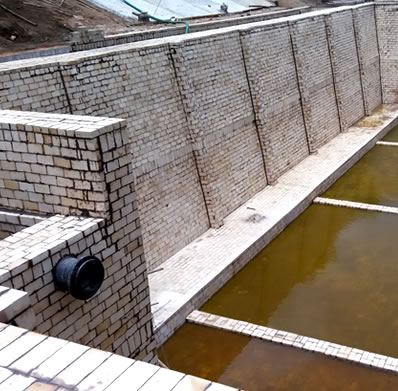AR Cements
Silicate Cements – are the first acid resisting materials known and widely used in chemical resistant masonry. It resists many mineral acids except hydrofluoric acid, Fluorosilicic acids, and their salts. Basically two types – based on Potassium Silicate or Sodium Silicate. Potassium silicate cements are more popular than Sodium silicate based cements and widely used owing to their superior acid resistance, better work-ability, high temperature resistance and sulphate resistance.
Sulphur Cements
Sulphur Cements are a single component, easy to use acid proof cement. Unlike other cements it does not require curing time. Hence they are more suited for maintenance jobs. They are extensively used in electrical insulators for fixing metallic parts on ceramics. They are also used in acid resistant masonry. The carbon filled sulphur cement find applications for stainless steel pickling units involving nitric and hydrofluoric acids service conditions and in phosphoric acid plants.
Resin Cements
Silicate cements have the disadvantage of very high inherent porosity typically of about 10% by weight and is thus considered highly permeable. Therefore, it is expected that whenever the silicate cement is used for brick or tile lining the liquid corrosive chemical is bound to reach the cement bedding interfacing the membrane and as a result the chemical stress on the membrane is bound to be severe.
On the other hand, resin cements have very low porosity typically less than 1% by weight in boiling water conditions and this makes resin cements superior in service. Added to it resin cements in general are characterized by higher compressive and bond strengths, have versatile acid, alkali, salt and solvent resistance. Their capable service temperature though are limited to 100 & 180 deg C, still most of the practical operating temperatures fall below this level and hence find extensive applications in a variety of chemical service conditions.
Phenolic, Furan, Synthetic and Epoxy resin cements are some of the popular cements used in chemical resistant masonry works.
Phenolic Resin Cements
Phenacin Resin Cements are the best acid resisting cement among resin cements including for high temperature service conditions. It is widely used in chemical, fertilizer and dye stuff industry. It is available in quartz filled and carbon filled versions.
Furan Resin Cements
Furan resin cements are the most used in acid resistant masonry in reactor / equipment linings, and for other applications. Owing to safer use and better shelf life compared to phenolic resin cements, it is increasingly being used and specified for AR lining applications. Newer grades have been introduced – FUROSPLITs – which are characterised by higher temperature & strength properties.
Synthetic Resin Cements
These are a new class of resin cements with versatile and resistance to a wide range of chemicals. They are also popular owing to their rapid setting characteristics which make them preferred cements when time is a constraint or limited in a project or a maintenance job. It is widely used and specified in paper and pulp industry applications.
Epoxy Resin Cement
Epoxy resin cements are known for their medium acid- and highly alkaline resistance. It has excellent bond strengths and compatible to a wide range of substrates. Owing to its high degree of impermeability it is sometimes a common practice to avoid membranes in acid resistant masonry construction where epoxy cement is used for bedding & jointing specification. Epoxy cement is more specified in power plant AR lining jobs and in water treatment plants.


